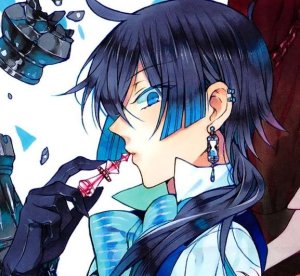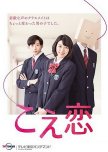I read some bad comments on this one after it won the family category in the 2016 poll (to be fair, I get that it's not really what we consider a "family" drama) but I thought that, after all the problematic love triangles we got in 2016 (A Girl & Three Sweethearts, Happy Marriage, Good Morning Call, etc. for all eternity), this was the most harmless and heart-warming take on romance triangles. Seriously, this is so pure and adorable that Sakura Shimeji does the theme song. But let's talk about it.
The plot of this drama is centered on a girl, Yoshioka Yuiko (very well portrayed by Nagano Mei) who falls for a classmate, Matsubara, after hearing his voice (to be fair, they chose Sakurai Takahiro to voice him, which is pretty brilliant, if you ask me, and seiyuus are really taking over idols lately in the j-music world, so this could be the beginning of something here, but I digress). When she meets him, we find out Matsubara hides his face behind a paper bag, something rooting in reasons we'll find out as the drama goes on. Yuiko accepts Matsubara since the very beginning and doesn't ask questions, focusing on who he is as a person and that relationship will help him open up about his past and his feelings.
There are, of course, love triangles galore. There's a couple girls who like Matsubara at different points of the drama, but I found them rather bland, especially in comparison to another character who is in love with Yuiko: Hyodo Makoto (brilliantly played by Ryusei Ryo). There are other smaller stories involving Yuiko's and Matsubara's best friends, as well as Makoto's friends (including a really good performance by Sakurada Dori).
This drama surprised me, in a good way. I was expecting that, for the whole cutesy aesthetic and the school romance, it was going to be just that, but it's so much more. There's social anxiety, growing issues, self-doubt, strong friendships and, since the whole harmless vibe it has leaves out any possibility of mindless bullying (everyone just accepts Matsubara without really asking much), it's allowed to focus on their inner troubles rather than cliche problems. Matsubara's biggest obstacle is always himself, as is Yuiko's, and that's very refreshing in this kind of story. Maybe a bit naive, but it's a different take on something we may have seen before, albeit in a different form.
I wouldn't go as far as to call it the Nobuta Wo Produce of its time, but it's definitely a breath of fresh air of actually meaningful relationships and healthy roads towards self-improvement in a year marked with toxic love triangles.
Was this review helpful to you?





















